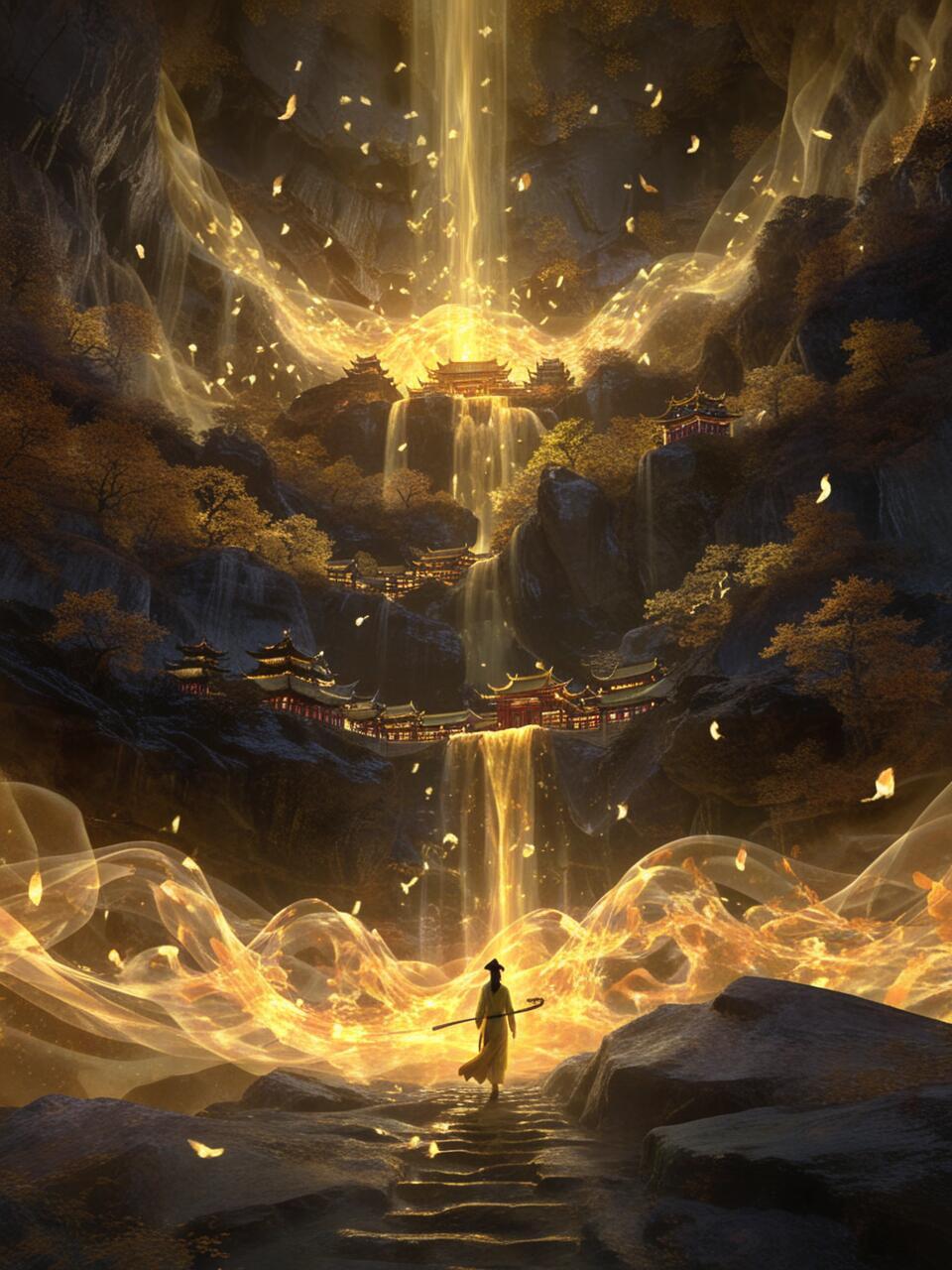In a quiet corner of a rural area, there is an ancient Taoist temple. This Taoist temple is like a witness of time, standing quietly there, exuding a mysterious and solemn atmosphere. The architecture of the Taoist temple is simple and elegant, with upturned eaves and dougong, red walls and green tiles, as if telling the long history and profound cultural heritage.
Around the Taoist temple are lush woods. Birds are singing cheerfully on the branches, adding a touch of vitality and energy to this peaceful land. A clear brook flows past. The brook is shining with golden light under the sunlight, like a flowing ribbon.
In this village lives an old man. The old man has experienced countless storms in his life. Years have carved deep wrinkles on his face, but they have also endowed him with tenacious qualities and rich life experiences. In his heart, this Taoist temple is the sustenance of his soul, a place where he seeks comfort and strength in times of trouble.
The old man often comes to the Taoist temple and brings incense and candles as offerings. He carefully places the incense and candles in front of the statue and then lights them. The faint candlelight flickers in the darkness, as if it is a symbol of hope. The old man prays silently, praying for the safety of his family and the peace of life. In his heart, the gods are omnipotent beings who can hear people's prayers and give people strength and courage.
In Taoist thought, humans and nature are in harmony. Humans are a part of nature and should respect nature and follow the laws of nature. At the same time, Taoism also emphasizes cause and effect. Good deeds are rewarded with good, and evil deeds are punished with evil. The old man firmly believes in this. He has been kind and upright all his life, helping others and never doing anything wrong. He believes that his kindness will definitely be favored by the gods, and his family will be safe and happy as a result.
One year, the village encountered a great disaster. A sudden flood swept through the entire village, and many families were severely affected. Houses were washed away, fields were flooded, and people's lives were in trouble. However, in this disaster, the old man's family was safe and sound in times of danger. The old man firmly believes that this is the guardianship of the gods and that his years of pious prayers have been answered.
Since then, the old man's gratitude to the gods has become deeper. He comes to the Taoist temple more frequently and brings more incense and candles as offerings. He hopes to express his gratitude to the gods through his actions and also pray that the gods will continue to bless his family and the village.
In Taoist allusions, there are many stories about the gods guarding and saving humans. For example, in the story of the Eight Immortals crossing the sea, the Eight Immortals show their magical powers and help people overcome difficulties. There is also the legend of Mazu. Mazu is compassionate and has saved countless people in danger at sea. The old man draws strength and confidence from these allusions. He believes that the gods will always guard them as long as they remain pious and kind.
As time goes by, the old man's body gradually weakens, but his faith in the gods never wavers. He still insists on coming to the Taoist temple, lighting incense and candles, and praying silently. His grandson, seeing his such persistence, is full of doubts. The grandson asks, "Grandpa, why do you believe in the gods so much? Are there really immortals guarding us?"
The old man smiles and replies, "Child, the gods are not necessarily in the form of immortals as we imagine. The gods exist in our hearts. They are a kind of faith, a kind of strength. When we encounter difficulties and setbacks, faith can bring us courage and hope and let us persevere. We must believe that as long as we are kind and upright, the gods will guard us."
The grandson listened to the old man's words and thought deeply. He began to understand that faith is not just a religious act but also a spiritual sustenance. It can let people find direction in difficulties and see hope in the darkness.
Under the influence of the old man, many people in the village also began to reexamine their faith. They all came to the Taoist temple, lit incense and candles, and prayed for the blessing of the gods. The incense in the Taoist temple is getting more and more prosperous, and people's hearts are also full of hope and strength.
However, faith is not a blind dependence. In Taoist thought, people should also change their destiny through their own efforts. The old man knows this well. In his life, he has always taught his family to be diligent, kind, and brave in facing difficulties. He believes that only through one's own efforts and struggles can one truly realize one's life value.
In the old man's later years, his family has always been by his side, taking care of his life. They deeply know the old man's piety and gratitude to the gods, and are also infected by the old man's kindness and uprightness. They together guard this faith and inherit this spirit.
When the old man was on his deathbed, he looked at his family and a relieved smile appeared on his face. He knew that although his life had experienced countless storms, he had always adhered to his faith and brought hope and strength to his family and the village. He believes that the gods will continue to guard them and make their lives more beautiful.
After the old man passed away, his story circulated in the village for a long time. People were moved by his piety and kindness and took him as an example to continue guarding that faith in the gods. And that ancient Taoist temple still stands quietly there, witnessing people's faith and hope and inheriting the wisdom and spirit of Taoism.



